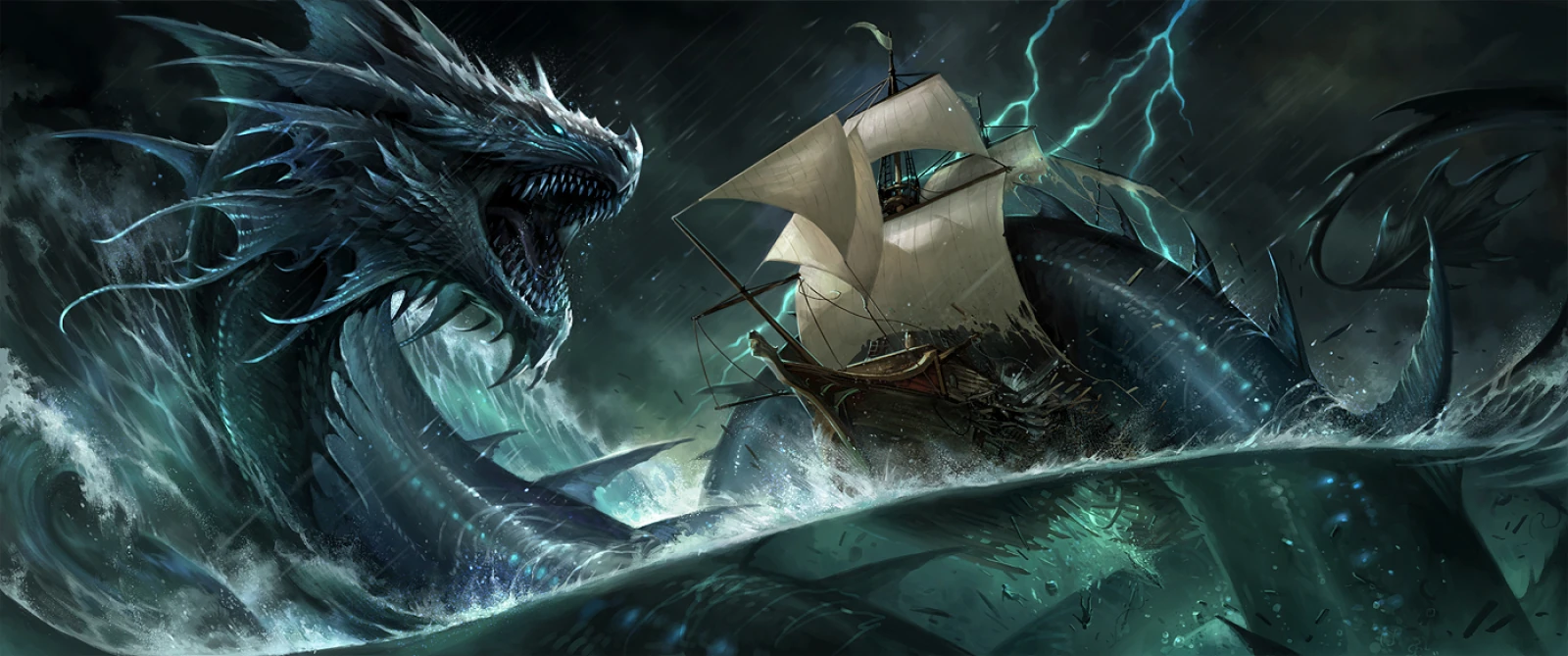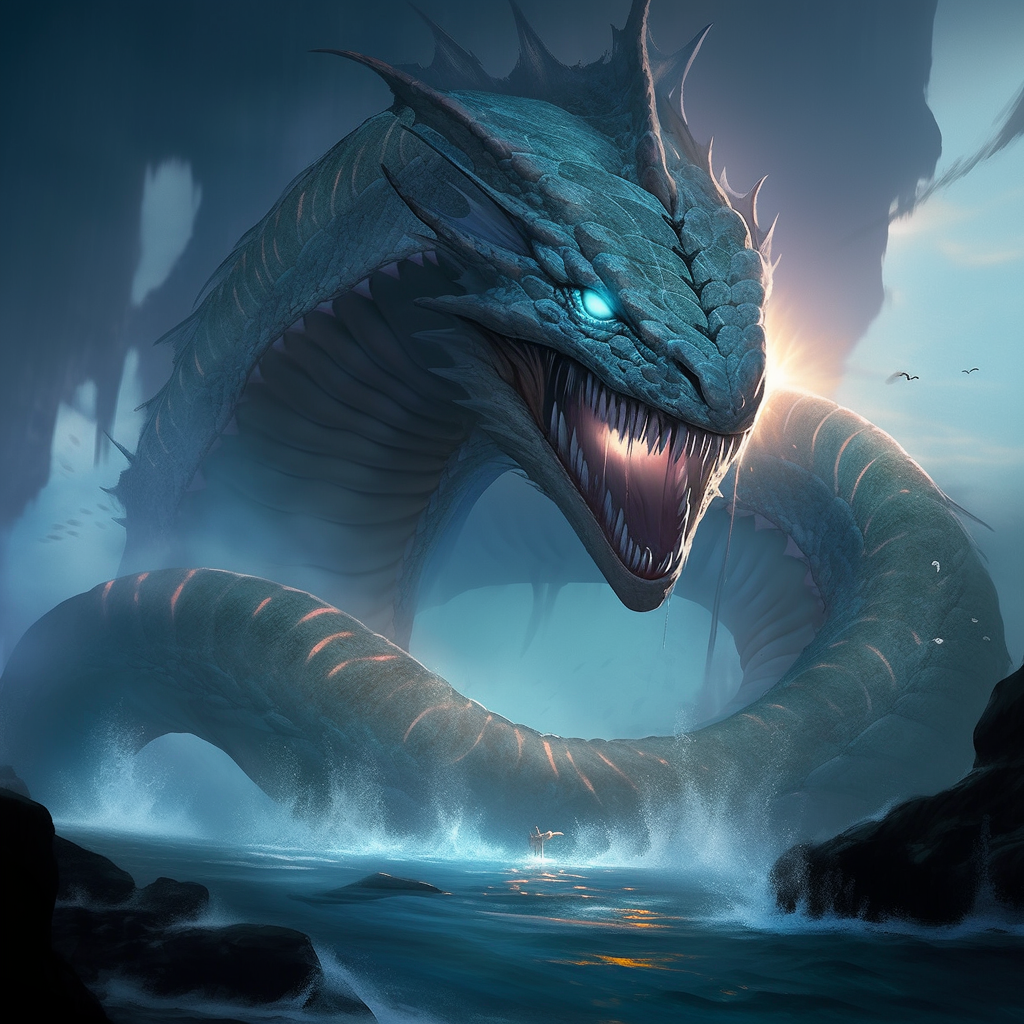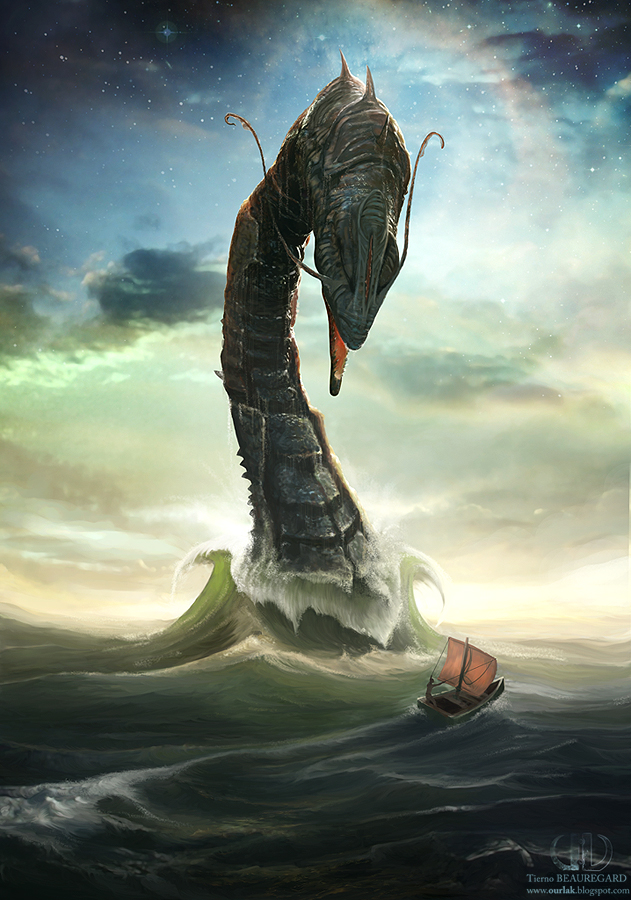The depths of the ocean have, for a very long time, held many secrets and, you know, some truly awe-inspiring tales. Among these stories, few creatures spark as much wonder and a bit of unease as the Leviathan. This immense sea beast, a figure found in ancient texts and old beliefs, has puzzled thinkers and storytellers for countless generations. It's almost as if its very nature resists being fully understood, leaving a trail of questions rather than clear answers.
From the pages of old religious writings to the whispers of ancient peoples, the Leviathan shows up as something truly powerful and, in a way, quite mysterious. People have long tried to figure out just what this creature might be, whether it is a real animal, a symbol, or perhaps something else entirely. Its presence in these old stories, so, really speaks to a deep human fascination with the vast, untamed parts of the world, especially the deep, deep sea.
We often hear about this creature, this truly massive thing, and it makes us wonder about its true origins and what it truly means. Is it a picture of something terrible, a symbol of wild, uncontrolled forces? Or does it, you know, represent something else, something even bigger than we can easily grasp? As a matter of fact, let's take a closer look at the different ways this legendary sea monster has been seen and described through the ages.
- Bombastic Side Eye Meaning
- Does Kai Cenat Have Adhd
- Laufey Fortnite Emote
- Asi Que Chiste Meme
- Billie Eilish Bikini Video
Table of Contents
- What is this Great Creature?
- How Did the Leviathan Get Its Start?
- What Does the Leviathan Represent?
- Did Christian Thinkers Connect Leviathan to Evil?
- Is there a Modern Take on the Leviathan Fat Guy?
- What about the Leviathan Fat Guy in Scripture?
- Why is the Leviathan Fat Guy so hard to understand?
- How Big is the Leviathan Fat Guy, Really?
What is this Great Creature?
The Leviathan, a creature mentioned in old writings like Job 40 and Psalm 74:14, has, basically, left many people who study these texts quite confused. It seems no one has come to a very clear idea about what this beast truly is. For ages, people have pondered its nature, its purpose, and its very real presence in the stories that have shaped our beliefs. It's a bit like trying to catch smoke; you know it's there, but you can't quite hold onto it.
This creature is known to be a truly enormous sea monster, one of the first beings brought into existence by Yahweh, who is the Christian God. There were, apparently, several other creatures of similar strength and might that also came into being at that very early time. The idea of such a colossal animal, moving through the deep waters, has, in a way, always captured the human mind, sparking both fear and a kind of deep respect for its immense power.
Stories tell us that Leviathan was a truly dangerous creature, so much so that even very experienced fighters would turn and run from it. The sheer presence of this beast, its immense size and strength, was enough to make even the bravest people feel a great sense of fear. It suggests a being of such overwhelming force that human efforts to control or confront it would be, you know, completely useless. This kind of power is, basically, something quite rare.
- Kinchana Ding Ding Ding Song
- Hanna Cavinder Ass
- Donovan Mitchell Gay
- Esposa De Mil Mascaras
- Lucy Mochi Controversy
Some beliefs suggest that Leviathan is no mere story, but rather a real creature of the sea. It is, in some respects, seen as being subject only to its creator, meaning it operates outside the usual rules of the natural world as we understand them. This idea gives the creature an even greater sense of awe and, perhaps, a little bit of mystery, placing it in a category of its own, separate from the animals we typically know.
How Did the Leviathan Get Its Start?
In Jewish mythology, Leviathan is pictured as a very old sea serpent, one that has been around since the very beginning. This idea of a massive, ancient serpent living in the waters is, you know, a powerful image that has lasted through time. It speaks to a very deep human connection with the sea and the unknown things that live within its vast, dark spaces. It's almost as if the sea itself holds these very old stories.
The origins of this creature can be traced back to very old stories from Mesopotamia, even before the time of the Bible. Specifically, it has roots in the tale of the sea monster in the Ugaritic myth of Baal, which features a powerful being known as Yamm. So, the idea of a great sea beast fighting against order is, basically, a concept that has been shared among different groups of people for a very, very long time, showing how similar some of our ancient stories really are.
What Does the Leviathan Represent?
Leviathan is a creature that holds many different meanings within the Bible. It is seen as a symbol of great disorder, a picture of badness, a reminder of what people cannot do, and a way to show the many kinds of things God has made. This creature, you know, is not just one simple thing; it carries many layers of meaning, making it a very rich topic for thought and discussion. Its presence helps to illustrate some very big ideas about the world.
The mentions of this creature in books like Job and Psalms, for example, help to paint a picture of its significance. These old texts use Leviathan to talk about things that are beyond human control, things that are wild and untamed. It's almost as if the writers picked this particular beast to show just how vast and, in a way, how mysterious the universe can be, and how small we are in comparison to certain forces.
This creature is also described as a truly colossal sea beast, one that comes from old biblical writings and various old stories. It stands for great disorder and a kind of raw, wild strength that cannot be tamed. The idea of such a huge, uncontrolled force has, basically, always been a source of both fear and a strange kind of wonder for people. It makes you think about the sheer scale of some things.
The legend of Leviathan has, you know, lasted for a very long time, showing up in stories and beliefs across many different cultures. This lasting presence speaks to the deep impact this creature has had on human thought and imagination. It’s a story that, apparently, continues to capture our attention, reminding us of the powerful forces that exist, or once existed, in the world.
Did Christian Thinkers Connect Leviathan to Evil?
Christian thinkers, those who spent a lot of time studying religious texts, came to see Leviathan as being connected with a bad spirit, a demon. This idea, you know, shows how the meaning of the creature changed and grew over time within different belief systems. It’s a way of taking a powerful, natural force and giving it a spiritual meaning, linking it to the struggle between good and bad in the world. So, it became more than just a big fish.
Is there a Modern Take on the Leviathan Fat Guy?
Interestingly enough, the story of Leviathan is not just stuck in the past. There is, for instance, an upcoming Japanese original net animation, an ONA series, called "Rivuaiasan." This show is being directed by Christophe Ferreira and is being made by a production team. It shows how old stories, you know, can still inspire new works of art and entertainment in our current time. It’s a pretty neat way to keep the legend going.
People are still, basically, looking at and thinking about the Leviathan story in new ways. They explore its beginnings, what it stands for, and how it is seen in different cultures and texts today. This ongoing interest suggests that the creature’s meaning is, in a way, still very much alive and open to new ideas. It's almost as if the Leviathan, this great leviathan fat guy, keeps finding new ways to show up in our collective imagination.
What about the Leviathan Fat Guy in Scripture?
The word “leviathan” shows up in several parts of old religious writings, very often pointing to a powerful creature of great size and a truly well-known, almost mythical, reputation. It’s a word that, you know, carries a lot of weight and suggests something truly immense. The mere mention of this term brings to mind images of something vast and ancient, a creature that holds a special place in the stories of old. It’s not just any big animal, you see.
In the Hebrew language, the word for this creature is לִוְיָתָן, which is pronounced "livyathan." This original word, basically, helps us to understand the deep roots of the creature’s name and its connection to very old traditions. Knowing the original term gives us a bit more insight into how it was first conceived and, perhaps, what its name truly meant to the people who first wrote about it. It’s a very old word for a very old idea.
This creature is, in fact, described as a giant sea serpent. The image of a truly enormous snake-like being, living in the vastness of the ocean, is a very strong one. It conjures up feelings of both wonder and, you know, a little bit of fear, as such a creature would be incredibly powerful and, basically, beyond human ability to control. This description of the leviathan fat guy really emphasizes its immense scale and its connection to the water.
Why is the Leviathan Fat Guy so hard to understand?
The Leviathan is, you know, often seen as a picture of great disorder, a wild force that threatens to consume those who have, so, finished their lives. This role as a bringer of finality and chaos makes it a very unsettling figure to think about. Its connection to the end of things, and its portrayal as a creature that might, basically, bring about a kind of final judgment, makes it a truly complex idea for people to grasp. It's almost like it embodies the very idea of things falling apart.
In the end, this creature is said to be completely brought to an end. The idea that even something so powerful and chaotic can be, you know, totally destroyed suggests a greater power at work. This ultimate fate of the Leviathan, this very leviathan fat guy, shows that even the wildest forces have a limit and can, eventually, be overcome. It’s a very significant part of its story, bringing a kind of closure to its immense, fearsome presence.
How Big is the Leviathan Fat Guy, Really?
The Leviathan is, basically, known to be a truly enormous sea monster, one of the first things Yahweh, the Christian God, made. Its size is a very key part of its legend, setting it apart from nearly all other creatures. The sheer scale of this beast, this very leviathan fat guy, suggests a being of immense physical presence, one that would dominate any body of water it inhabited. It's a size that is, you know, hard for us to even picture in our minds.
Stories mention that there were several other creatures of similar strength and might, which were also among Yahweh's first creations. This suggests that the Leviathan was not alone in its immense power, but was part of a group of truly powerful, early beings. The existence of these other creatures, you know, further emphasizes the extraordinary nature of the Leviathan, placing it in a category of truly exceptional and original creations. It’s a very select group, to be sure.



Detail Author:
- Name : Liliane Gerhold
- Username : rjakubowski
- Email : nikita.gleason@yahoo.com
- Birthdate : 1981-12-21
- Address : 6487 Yost Prairie Boscostad, LA 60330
- Phone : (704) 724-1982
- Company : Little, Adams and Larkin
- Job : Automotive Master Mechanic
- Bio : Earum qui sit aut dolores aperiam doloremque. Ut eius dolorem qui et. Quis inventore sed a minima laborum soluta vero repudiandae. Non non dolorum qui enim veritatis et maxime.
Socials
twitter:
- url : https://twitter.com/aniya_frami
- username : aniya_frami
- bio : Veniam omnis est aut eum enim quos. Voluptas iste sunt ea quia odio. Vitae aut illo officiis quia quisquam.
- followers : 2302
- following : 245
instagram:
- url : https://instagram.com/aniya_official
- username : aniya_official
- bio : Eaque minima quam reiciendis perspiciatis. Eveniet sed voluptatum saepe omnis vero ut.
- followers : 139
- following : 360
linkedin:
- url : https://linkedin.com/in/aniyaframi
- username : aniyaframi
- bio : Est ducimus quis consequatur velit.
- followers : 3230
- following : 373